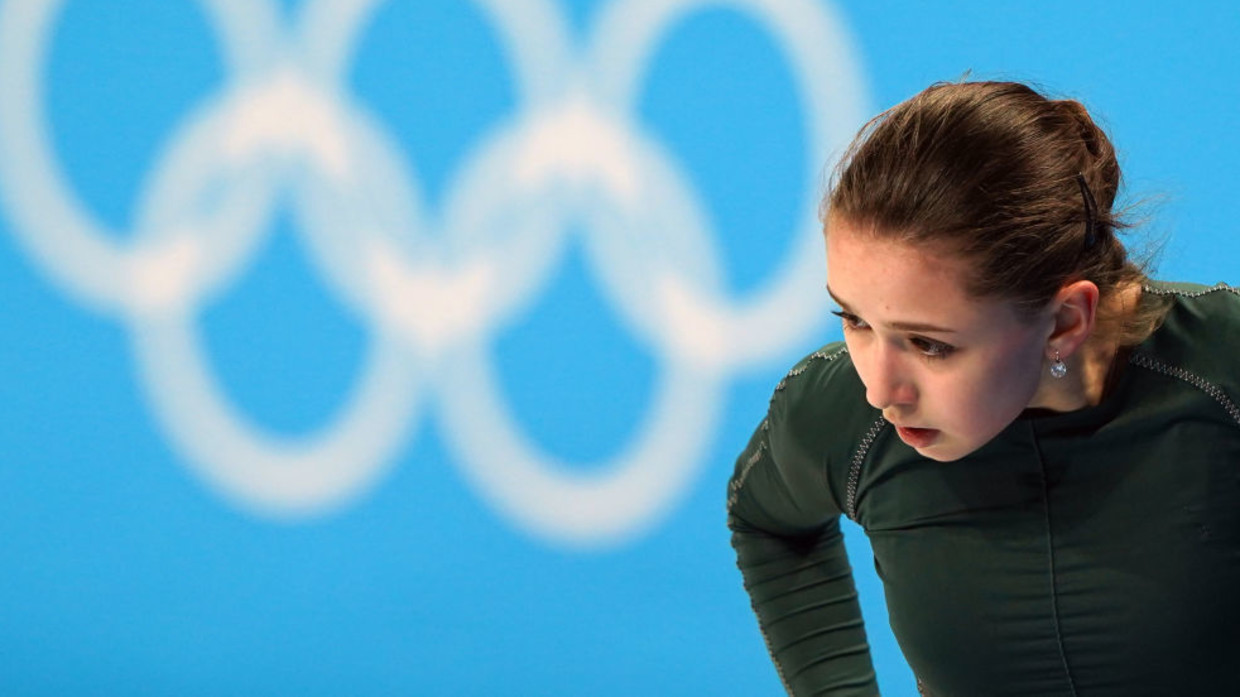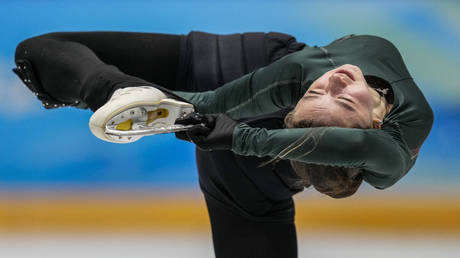Kamila Valieva could not have expected the week to fly past in quite the manner in which it has after arguably the finest performance of her career.
Less the parade of victory and anticipation than it should have been, more a whirlwind of often-unedifying conjecture, it is clear that Valieva's doping case has taken a considerable toll on an athlete whose extravagant talent belies her age.
That Valieva has continued to train under the kind of pressure that most adults will hope to never encounter in their lives is testament to a required fortitude that makes for highly uncomfortable viewing under the glare of whirring cameras.
The Beijing Games are already providing the trickiest conditions for athletes of any Olympics, with the possible exception of the Tokyo Games that were moved by a year to 2021 while the pandemic made planning even more uncertain than it is for organizers today.
Throw in an almost non-stop, seven-hour, late-night hearing on whether you are allowed to stay there, which is how Valieva described the deliberations of the case at the CAS, and you have a hellish experience for an athlete to go through.
The cruel timing of the emergence of her test result, requiring an investigation too complex to provide quick answers just after the ROC had won the team event, meant there was no time for a proper defense to be organized before the start of the singles competition.
After a bewildering rollercoaster condensed into the space of a few days, there is hopefully some sense of peace for Valieva on the ice where she provides such exquisite performances.
Russian former Olympic ice dancing champion Tatiana Navka spoke of her tears and worry at watching Valieva tune up without knowing whether the Court of Arbitration for Sport (CAS) would end her debut singles campaign before it had begun, yet the European champion articulated later on Monday why her sport will be a sanctuary for her following a verdict delivered purely on whether she would be provisionally suspended.
Valieva had been in limbo. She naturally responded to the decision that she can skate on with measured relief, even though it means her limbo is doomed to persist for months or even years because the IOC has decided that there will be no ceremony if she wins a medal, meaning she has no idea whether she is skating in a dead rubber.
If she wanted closure, Valieva now knows it remains a long way off. She could light up the Games with another supernaturally gifted performance and have nothing stronger to show for it than more derision from those who would cast her as a cheat without her level of innocence ever being properly adjudicated on.
The World Anti-Doping Agency, International Olympic Committee and International Skating Union all appealed against Valieva's right to take part in the individual events. From statements by numerous teams savaging the decision to allow Valieva to compete to reports casting her as a poster girl for sporting skullduggery, she will be in no doubt that she is not welcome at the Games by many. Months into her career, Valieva will sadly be trailed by relentless questions regardless of what happens between now and the end of the Games.
Many of the responses to Valieva's plight seemed to balance a distinct lack of empathy with a contentment to hammer a 15-year-old. Some of them would evidently have found it useful to be reminded of the dedication with which Valieva has reached the top of her sport in world record-setting style, only for her to potentially be remembered for a heart drug that no-one with expertise believes would enhance her sensational performances. It is rare to see so many reports leap to conclusions while appearing to all-but forget that the case or its circumstances are yet to be proven.
The media coverage casts few in a light to be proud of. The athletes who Valieva will compete against know that they will inevitably be overshadowed by what has happened, and that they will not be rewarded with a ceremony – the pinnacle of many athletes' careers – should they achieve a podium place accompanied by the finest current female figure skater of their generation.
There are no winners here. Such is Valieva's predicament that you wonder whether it is even worth her while to compete in the singles. At a Games already dimmed by politicization, Valieva has been the unwitting subject of an outpouring of hostility that you feel is at least partly based on her nationality rather than a desire for proportionality and fairness.
Outlets that purport to pride themselves on balance and reason have used her for attempts at political point-scoring. The case conclusively proves that Russian athletes will always cheat and are now destined to cheat forever, some have loudly insisted. There will, undoubtedly, be more of that to come before Valieva's campaign comes to a close on Thursday.
CAS's observation that a ban from the rest of the Games would cause "irreparable harm" to Valieva was telling – and greeted, predictably, by accusations that other athletes and the Games will be hurt more than she could have been. The question of whether the no-win situation she now finds herself in is any better hangs heavily in the balance, but it would have felt like a victory for the legion of pious, judge-and-jury critics of Valieva had she been definitively deprived of the moments she has spent her precocious career building towards. Ultimately, the potential impact on Valieva of exiling her from the Olympics is more alarming than any amount of external dramatization.
Quietly, determinedly, Valieva will no doubt let her brilliance speak louder than words again, even as the mud-slinging goes on from those who cannot wait to rip into her. If nothing more, the course of the next three days should give this extraordinary talent a measure of catharsis in a grim ordeal.
By Ben Miller
The statements, views and opinions expressed in this column are solely those of the author and do not necessarily represent those of RT.


